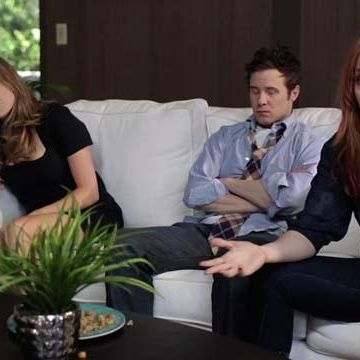
Family reunion ensemble psycho-comedies have distinctive squirmy rhythms, but IÔÇÖve rarely writhed through one the way I did watching Will SlocombeÔÇÖs Cold Turkey. First that title ÔÇö bad. Last spring it was called Pasadena, which isnÔÇÖt much better but has the virtue of looking like a placeholder. The film is set, in fact, in Pasadena, in a rambling and expensive house that is presided over by a patriarch called Poppy (Peter Bogdanovich). We use the word patriarch loosely these days, but this is very much a big-daddy ecosystem, the women and boys circling warily, mindful not to disturb the Great Thinker.
SlocombeÔÇÖs own dad, Walter, was one of the actual Great Thinkers behind our recent, catastrophic occupation of Iraq, and so, as it happens, was the ÔÇ£fictionalÔÇØ Poppy. Unlike Bush, Cheney, Rumsfeld, Wolfowitz, Doug Feith, and John Yoo (among many others), Poppy is paying a heavy price for his murderous incompetence. Stanford wonÔÇÖt have him anymore. Most academics have ostracized him. He wakes up with a big glass of wine (with ice) and keeps his drinking up all day. HeÔÇÖs never sloppy, though. Only sodden and somber. His three grown kids arenÔÇÖt home for Thanksgiving for love, at least not love alone. They have dark secrets. They need money.
From the start, the air is clotted with resentment. PoppyÔÇÖs two grown daughters from his first marriage are openly contemptuous of his younger wife (Cheryl Hines), who has remade the house in a distinctly Long Island Jewish mode. Sonya Walger plays Lindsay, an intense, teeth-grittingly focused yoga instructor with a husband, two sons, and a major problemo. Alicia Witt is Nina, the tempestuous free spirit with a big mouth and hot-pink streaks in her flame-red hair. (She arrives with her latest boyfriend, a cute, diffident trucker.) Ashton Holmes is Will SlocombeÔÇÖs presumed alter-ego, Jacob, a boy-man and compulsive gambler whose kneecaps (and possibly the rest of him) might not be long for this world.
Cold Turkey is edited for maximum discomfort. True, there are long, winding takes as one or another character moves through the sprawling house, but whenever people stop and congregate the editor leaps from one awkward, frozen close-up to the next. Adding to the unease is the performance of Bogdanovich, a man who has directed many extraordinary films but is best known nowadays as an actor. He isnÔÇÖt a trained one, though, and he has chosen to play Poppy by remaining inert, his jowls hanging limply, his eyes fixed, his face dead rather than deadpan. The effect reminds me of director Peter SellarsÔÇÖs legendary ÔÇÿ70s Harvard production of IbsenÔÇÖs When We Dead Awaken, for which Sellars was unable to find a suitable actor to play the titanic protagonist, Rubek ÔÇö and so substituted a large pile of rags around which the rest of the cast emoted. Bogdanovich does, however, have an excellent breakdown late in the film. And he doesnÔÇÖt overplay the alcoholism, which is nice.
The movie should be seen for Walger and Witt. The former (she played DesmondÔÇÖs lost love Penny on Lost) has the less show-offy role, but you can feel her fear in the tightness of her face and limbs, and when she blows up at WittÔÇÖs Nina you see a sisterly resemblance where none could be discerned before. Witt has created a character who makes lilting music out of taunting people, plucking at their emotional scabs like banjo strings. Her hatred is so stylized that when raw feeling bursts through her fa├ºade it scares her as much as everyone else. Cold Turkey is a simmering piece of holiday dystopia with a good, scorching boil-over.


